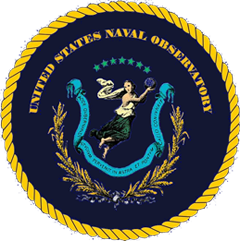Astronomical Data Used for Litigation
The U.S.
Naval Observatory (USNO) does not furnish data specifically tailored for
litigation. The data describing
astronomical phenomena, provided by the USNO, are intended for public
information and general use. The data are computed and are not reports of
observed or recorded events. The computations assume certain conditions and
the data might therefore not be relevant to the facts at issue in a
specific case. The data are provided without seal or certification
regarding authority, custody, or authenticity, and acceptance by a court is
not guaranteed.
Astronomical data are sometimes needed for civil or criminal court
proceedings, especially where there is an issue of the amount of natural
illumination available during the incident in question. Both astronomical
and meteorological information may be needed in such cases.
The USNO does not collect or maintain records or systems of records
of astronomical phenomena—for example, observed times of sunrise,
sunset, twilight, or Moon phases— that might be useful for
litigation. Such observations are not regularly made by any agency of
the U.S. Government, since the relevant data can be computed for past or
future dates to sufficient accuracy for all practical purposes. In this
sense, astronomical data are different from weather data, which must be
observed and recorded.
The Astronomical Applications Department of the USNO
provides Web pages where these computations can be made online. For
example, the Web page titled Sun and Moon
Data for One Day provides sunrise/sunset, moonrise/moonset, and
twilight times along with Moon phase for any specific date and place.
Other astronomical information can be found in the department's Data Services pages. There is no charge for these data
services. These kinds of astronomical computations can also usually be
performed by any observatory, planetarium, university astronomy department,
or other competent authority.
If a litigant desires a signed letter or some other type of "certified"
document containing the calculated data, there are several private-sector
sources that can be used. Resources that can assist you in finding
information and expert testimony are listed below under
Forensic Services.
For further information on this subject see:
In particular, attorneys should review the last reference prior to
making any requests for information or testimony. The instruction includes
this statement: "DoN [(Department of Navy)] personnel... shall not provide,
with or without compensation, opinion or expert testimony concerning
official DoD [(Department of Defense)] information, subjects, personnel, or
activities, except on behalf of the United States or a party represented by
the Department of Justice, or with the written special authorization
required by this instruction."
Weather information
is not available from the USNO. Official
weather records (cloud cover, precipitation, etc.) compiled throughout the
United States are available from:
National Centers for Environmental Information
Civil time (zone time, daylight time) legally in effect at
locations within the United States is determined by the Secretary of
Transportation. Information may be obtained from:
Department of Transportation
FORENSIC SERVICES
The following are sources of information that can assist in
locating expert support for forensic inquiry, interpretation of
data, and litigation. This list is not exhaustive and is not to be
construed as an endorsement by the U.S. Government of any
services, or of companies or individuals recommended by the
services.
The
Technical Advisory Service for Attorneys
refers experts for a range of forensic and consulting services.
The
American Weather and Climate Industry Association
has a list of U.S. commercial weather companies and services.
The
National Association of Professional Accident
Reconstruction Specialists
can provide information
on forensic issues arising out of various types of accidents.
The
List of Certified Consulting Meteorologists
is a listing of weather experts published by the American
Meteorological Society.
Astronomical information can often be obtained locally
from astronomers or celestial navigation instructors at public and
private schools, colleges, observatories, planetariums and
maritime academies.

